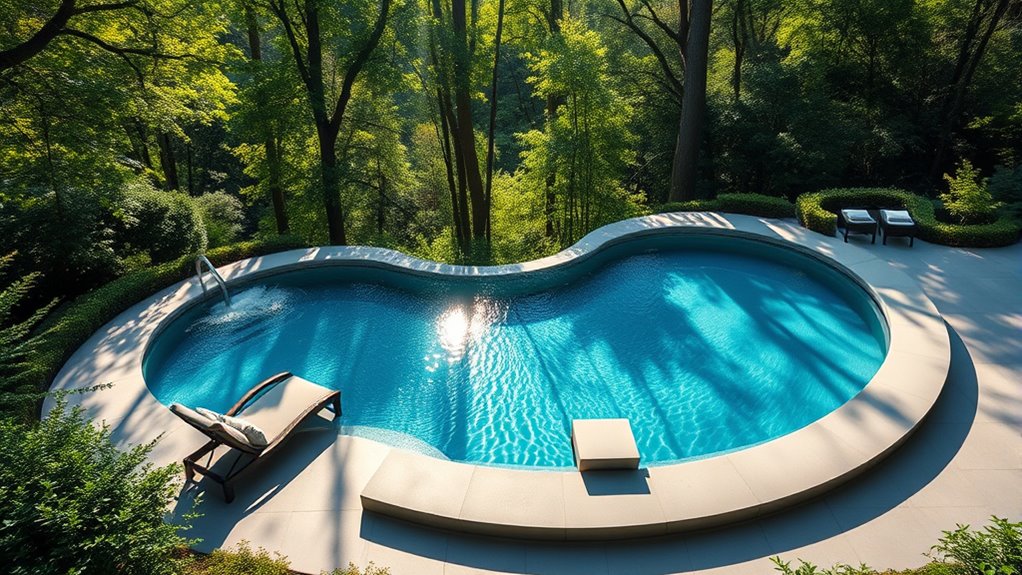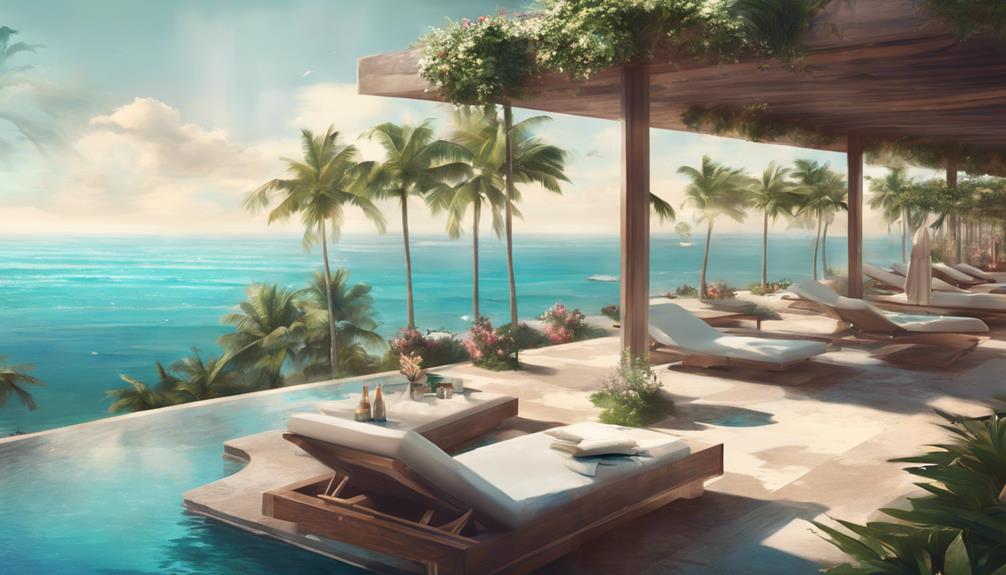Choosing the right pool shape shows how your outdoor space functions and reflects your style. Narrow or irregular yards look great with freeform or kidney-shaped pools that blend naturally with landscaping. Wide open yards suit rectangular or geometric pools for a modern feel. Compact or small spaces benefit from plunge pools that maximize water area. The shape you pick can create zones, enhance visuals, and make your yard feel more cohesive. Keep exploring to find the perfect fit for your space.
Key Takeaways
- Rectangular pools suggest a spacious, modern yard with a focus on symmetry and clean lines.
- Freeform or kidney-shaped pools indicate a natural, organic landscape blending with irregular or small spaces.
- Compact or plunge pools are ideal for small yards, maximizing water area while conserving space.
- Multi-level or L-shaped pools create designated zones, reflecting a versatile and functional outdoor layout.
- Custom-shaped pools reveal tailored design choices that harmonize with unique yard features and landscape integration.

Choosing the right pool shape isn’t just about aesthetics; it also reflects your space’s layout and your lifestyle. When contemplating pool shapes, you should think about how the design will fit into your yard and how you intend to use it. A custom design offers the flexibility to tailor your pool to your specific needs, guaranteeing maximum space utilization. Instead of settling for a standard shape, you can work with designers to create a pool that maximizes your available area, making it both functional and visually appealing.
Select a pool shape that complements your space and lifestyle for maximum enjoyment and visual harmony.
If you have a narrow or irregularly shaped yard, a freeform or kidney-shaped pool might be ideal. These shapes can be customized to fit tight spaces and provide a natural, organic look that blends seamlessly with landscaping. Conversely, if your yard is wide and open, rectangular or geometric pools can create a sleek, modern vibe that emphasizes space and symmetry. These shapes also lend themselves well to space optimization because they can be aligned precisely with property boundaries, leaving room for lounging areas, patios, or gardens around the pool.
For smaller yards, a plunge pool or compact design might be the smartest choice. These pools maximize water area while taking up minimal space, allowing you to enjoy a revitalizing dip without sacrificing yard usability. Custom design plays an essential role here, enabling you to shape the pool to fit perfectly within the available footprint, whether that means a narrow strip or a corner nook. This approach guarantees you don’t waste space but instead transform even limited areas into inviting aquatic retreats.
L-shaped or multi-level pools are excellent options if you want to create zones within your yard. These shapes can serve different functions—such as a shallow lounging area and a deeper swimming zone—while utilizing space efficiently. With a custom design, you can incorporate features like built-in seating, waterfalls, or islands, all tailored to your landscape. This not only maximizes the functionality of your yard but also enhances its visual interest.
Additionally, considering the importance of landscape integration in your pool design ensures that your pool complements existing or planned outdoor features, creating a cohesive outdoor environment. Ultimately, choosing a pool shape based on your space and lifestyle involves more than just picking a pretty outline. It’s about understanding how each shape interacts with your yard’s dimensions and how you want to use your pool. Custom design allows you to make the most of your space, ensuring your pool complements your environment while fulfilling your recreational and aesthetic needs. When you take the time to contemplate these factors, you’ll end up with a pool that truly feels like a natural extension of your home and lifestyle.
Frequently Asked Questions
What Are the Maintenance Differences Between Various Pool Shapes?
The maintenance differences depend on your pool’s shape, affecting cleaning and shape durability. For example, freeform pools often have more corners and curves, making pool cleaning more challenging and requiring extra attention to debris buildup. Geometric shapes like rectangles tend to be easier to clean and maintain because of their straightforward design. Overall, simpler shapes usually mean less frequent maintenance, helping preserve shape durability and keeping your pool in top condition.
How Do Pool Shapes Impact Energy Efficiency?
Your pool shape markedly impacts energy consumption through shape optimization. A simple, rectangular pool minimizes the surface area exposed to the air, reducing heat loss and energy needed for heating. More complex shapes, like freeform designs, may increase energy use due to additional surfaces requiring heating and circulation. By choosing a shape that promotes efficient circulation and heat retention, you can lower energy costs and improve overall energy efficiency.
Can Changing Pool Shapes Increase Property Value?
Changing your pool shape can boost your property value by enhancing design flexibility and aesthetic appeal. A unique or modern shape can make your backyard stand out, attracting potential buyers. It also allows you to customize the space to fit your lifestyle and complement your home’s architecture. By investing in a shape that’s both functional and visually appealing, you create an inviting outdoor area that adds long-term value to your property.
Are Custom-Shaped Pools More Expensive to Install?
Yes, custom-shaped pools are generally more expensive to install because of increased cost considerations. While they offer design flexibility that lets you create a unique, personalized backyard, the intricate construction and specialized materials drive up costs. You get the luxury of a one-of-a-kind design, but be prepared for higher expenses. Balancing your desire for a tailored look with your budget helps ensure your pool fits both your style and financial plan.
How Do Pool Shapes Influence Safety Considerations?
Your pool shape substantially impacts safety considerations. For example, freeform pools with curves can create visibility concerns, making it harder to supervise swimmers. Rectangular pools often provide clearer sightlines, aiding safety. You should install safety barriers suited to your pool shape to prevent accidents. Regularly assess your pool’s design for visibility issues, and guarantee barriers are secure, especially around uniquely shaped pools where supervision might be more challenging.
Conclusion
Choosing the right pool shape is like selecting the perfect frame for a masterpiece; it subtly reflects your space’s personality and potential. While some shapes gently whisper elegance and openness, others quietly hint at intimacy and practicality. Remember, the shape you embrace doesn’t just define your pool—it subtly influences how your entire outdoor area feels. Trust your instincts, and let your choice quietly speak of your style, inviting harmony and comfort into your private sanctuary.










